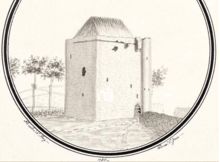Donore Castle
| Donore Castle | |
|---|---|
|
Native name Irish: Caiseal Dhún Uabhair | |
 | |
| Type | tower house |
| Location |
Donore, Ballivor, County Meath, Ireland |
| Coordinates | 53°29′36″N 6°56′31″W / 53.493406°N 6.942018°WCoordinates: 53°29′36″N 6°56′31″W / 53.493406°N 6.942018°W |
| Area | Boyne Valley |
| Height | 12 m (39 ft) |
| Built | 1430s |
| Official name: Donore Castle | |
| Reference no. | 232 |
 Location of Donore Castle in Ireland | |
Donore Castle is a tower house (caiseal) and National Monument in County Meath, Ireland.[1]
Location
Donore Castle is located on the north bank of the Boyne, south of the R161, just upriver of the point where it meets the Enfield Blackwater.[2]
History
.jpg)
In 1429 Henry VI, King of England and Lord of Ireland in an effort to defend The Pale, granted ten pounds to any of his subjects who built a small defensive tower (20 × 16 × 40 feet) on the edge of the Pale before 1439. The tower house at Donore is assumed to be one of these castles, built by the local power, the Mac Eochagáin (McGeoghegans). In 1650, during the Cromwellian conquest of Ireland, the castle was taken by forces under Sir John Reynolds and over 40 members of the McGeoghegan family were massacred.[3]
According to the Civil Survey (1654–56) Garrat Lench of "Donowre" owned 220 acres (89 ha) in 1640, and on the property was ‘a Castle and Orchard, a weare and some cottages.’ An illustration from 1785 shows the castle occupied with a hip roof (where all sides slope downwards to the walls).
Building

The castle has three storeys, and measures 7.3 × 6.3 m at the base, and is 12 m (39 ft) tall with rounded corners a projecting round tower at the corner housing a newel stairway.[4] It has a vaulted roof on the lower floor and mural garderobe and a fireplace on the upper floors. The ceilings were supported on corbels. One of the Castle's defenses is a murder hole situated at roof level above the entrance door. There are also carved heads of a king and bishop above the doorway.[5][6][7]
References
- ↑ "The tragic history of the MacGeoghegan's of Donore Castle - Irish Origenes: Use Family Tree DNA to Discover Your Genetic Origins - Clans of Ireland - Irish Surnames Map".
- ↑ "Donore Castle, Co. Meath".
- ↑ Past, Ed Hannon-Visions of the (22 July 2013). "Donore Castle, Meath, Ireland".
- ↑ "Donore Castle".
- ↑ "Historic Sites of Ireland: Donore Castle".
- ↑ "Ireland In Ruins: Donore Castle Co Meath".
- ↑ "Travelmania Ireland - Donore Castle Ruins, County Meath".